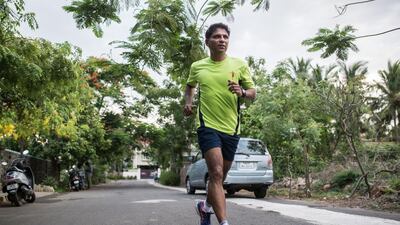NEW DELHI // Shahid Kandrikar’s Ramadan schedule is an unusual one. After working all day at his shoe-manufacturing business, he puts on his trainers and runs eight kilometres before sitting down to break his fast.
Mr Kandrikar laps an 800-metre circuit that takes him through a park near his neighbourhood in central Chennai and then on to a road bustling with rush-hour traffic.
“The pollution is bad,” he says. “But during Ramadan, this is really the only time I can run.”
A culture of running has grown in India over the past decade. In cities across the country, joggers and marathoners fill the roads and parks every morning and evening.
“Back in 2002, when I began running competitively, you hardly saw anyone running,” says Mr Kandrikar, 46.
“I remember how people would stop me on the road and ask: ‘Why are you running? It’s bad for your knees’.”
For Muslim runners, the restrictions on eating and drinking during Ramadan pose a challenge if they want to continue pounding out the miles. This year it is even harder as the holy month falls in midsummer, which means the days are long and draining.
Mr Kandrikar must eat his suhoor before 5.45am. Iftar comes nearly 13 hours later, when the sun sets.
The intervening time is hot and humid, as Chennai lies on the coast. Temperatures can touch 40°C, and the humidity ranges between 50 and 80 per cent. Even without fasting, runners who train outdoors can easily become dehydrated.
“It was difficult to run during Ramadan initially, when I first started doing it in 2007,” Mr Kandrikar says. “I had to start slow and pace myself. But I find now that a run leaves me feeling lighter and more energetic. I’ve gotten used to it.”
In Chennai’s community of Muslim runners, Mr Kandrikar was something of a pioneer. When Shahul Hameed, a 48-year-old entrepreneur, decided in 2011 that he too would try to maintain his mileage during Ramadan, he turned to Mr Kandrikar for advice.
“Shahid told me how he trained, and that he sometimes did long runs after his evening meal, at around 10.30pm,” Mr Hameed says. “I had to find out what worked for me, though. I couldn’t run at night, because it was very difficult to sleep after that much exercise.”
Through trial and error, Mr Hameed also settled on a pre-iftar slot. He deliberately lightens his workload during Ramadan, and heads home at 5.30pm, just in time for a run before prayers and dinner.
“I run for about half an hour, trying to do five kilometres,” he says. “And I stick to just doing laps in my street near my house. What happens if I collapse? I wouldn’t have had a sip of water in more than 12 hours, and the body is already dehydrated. This way, if anything happens, I’m close to home.”
Mr Hameed has slowly built up his endurance. The first year he ran during Ramadan, he managed only three or four runs through the month. He ran every alternate day last year and is maintaining that pace this year, managing five runs in the first 10 days of the month.
“The way I drink water has changed too,” he says. “Earlier, I would gulp down half a litre of water immediately, and then I would feel too full and unable to eat. Now I sip water slowly, continuously, over the course of a couple of hours. This way, I drink maybe a litre and a half, or two litres, and I can still eat.”
“You often tend to overeat [during iftar],” Mr Hameed says. “But because I go running, I feel refreshed and light even after I eat.”
In east Delhi, Tanvir Kazmi does steady, slow-paced runs in the evenings, circling a 1.5-kilometre loop in a park near his house just before iftar.
“If I’m doing speed-running sessions, I save those for after the meal, after a break of half an hour or so,” he says. “It’s dangerous to do those while you’re still fasting.”
These days, Mr Kazmi’s 10-year-old son accompanies him so he keeps the runs short, to about two kilometres. But in 2010, he had to run seriously throughout Ramadan as he was training for the Comrades Ultramarathon in South Africa.
“I would go for a two-hour run at a slow pace before breaking my fast, then eat, and then go run for another two hours,” he says.
It sounds brutal, he admits. “But this is something I’ve discovered as a part of my exploration: That the human body is capable of adapting, and of extending itself in the face of a challenge.”
ssubramanian@thenational.ae

